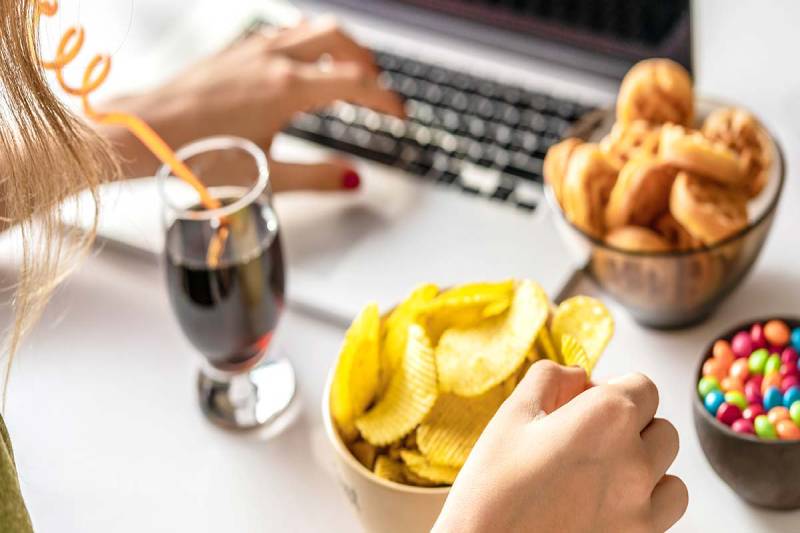Enhance awareness of oneself
Everyone are going through a difficult time right now, on the inside as well as the outside. Eating is primarily an escape from coping with negative emotions in a situation of stress. All attempt to repress stress rather than seeing it as an indication that we need to look after ourselves. Being mindful and growing in understanding of our relationship with our bodies, food, and eating are the main objectives. Usually, when eating industrialized, processed food that raises our blood sugar levels, it stimulates the body and temporarily dulls our senses. As with addiction, the effect wears off and we start to need more, which is the problem. Recall that eating might temporarily “whisper” symptoms, but this is a cycle.
Develop empathy for yourself
Eating in opposition to our bodies’ requirements causes unpleasant physiological side effects as well as guilt, judgment, and self-loathing, all of which can make the issue worse. As if a voice from within is asking, “Are you holding me responsible? I’ll prove it to you by eating much more!” We must accept and welcome uncomfortable feelings with self-compassion in order to end the cycle.
Put the stop, identify, and accept method into practice.
The acronym stands for Stop, Identify, and Accept, despite its intimidating sound. Stop first, and then recognize that we are in a circumstance where we are feeling angry, frustrated, and irritated. Following identification, we must acknowledge our experiences and tell ourselves that it’s normal; we haven’t always felt this way and we won’t feel this way forever. We may not always require ice cream to numb the uncomfortable emotions if we accept to feel, thus just allowing these feelings space already brings relief.
Adopt a positive self-talk mindset
It’s important to practice positive self-talk when coping: talk to yourself the way you would talk to a close friend or our kids. You don’t need to tell yourself things like “you’re stupid and a loser,” just as you wouldn’t say to your kids.
Rather, make an effort to normalize your situation and accept that you are a human. Reiterate statements such as “I’m not the only one feeling this way right now” and “It’s natural to be stressed at the moment.” Eating food to soothe ourselves is also acceptable. When everything around you seems bitter, it’s only natural to look for sweetness. Even if we acquire a little weight, it won’t be the end of the world since we can understand ourselves.
Pay attention to your body
Give up on universally applicable formulas, such as the idea that breakfast should be the most essential meal of the day, as you might find that eating at midday works better for you. In general, it’s important to pay attention to your hunger and fullness cues. Each person must do their own personal examination of the meal’s content. Which is more conducive to feeling better, a croissant or a salad with quinoa? The body will tell you what’s healthy for it. It will point you in the proper direction if you pay attention to these feelings.
Consider what will be best for you
Think to yourself “What will benefit me?” or “What do I need right now?” while you’re feeling stressed. Putting the kitchen or closet in order, conversing with a buddy, or making a video chat with the grandchildren are a few examples. You can see that eating more ice cream or watching more news may not be the best things for you when you ask yourself what makes you feel connected to your resources.
Alternatively, you can make a connection to a space of introspection and consciousness. Therefore, even if you determine that having a croissant or nice bread with avocado will help you, this will be a conscious choice that you make after eating without feeling guilty. By doing this, you can prevent yourself from starting a vicious cycle of resistance, condemnation, and guilt.
Apply this model to provide emotional support
The more we take care of ourselves, the more we cultivate the good things in life, and the more resilient we are by nature, which lessens the need for emotional eating. Our goal is to strengthen the positive aspects rather than combat the negative ones. You can use the abbreviation “Sweet” to substitute emotional feeding for emotional eating:
Being mindful involves being aware of the triggers for emotional eating, being in the present, and seeing what feeds and supports oneself as well as what doesn’t.
Resources: Making a connection with our purpose and assets. Giving, regardless of the kind, is one activity that most fulfills us. It’s critical to maintain connections with the activities, hobbies, music, reading, gardening, and meditation that bring us joy. Everybody has what works best for them.
Activity that involves some physical movement of the body includes stretching, strolling around the house, and other similar activities. Additionally, movement in a more general sense of doing—organizing paperwork, cleaning out the mailbox, etc.—is intended here; the important thing is to be moving.
Community: Interaction, proximity, embraces, and talks among people. Maybe now is not the time for a buddy who believes everything is black and white, but generally speaking, it’s important to get together or talk on the phone and not withdraw.

 Diabetology2 weeks ago
Diabetology2 weeks ago
 Diabetology7 days ago
Diabetology7 days ago
 Diabetology7 days ago
Diabetology7 days ago
 Diabetology4 days ago
Diabetology4 days ago
 Diabetology15 hours ago
Diabetology15 hours ago















